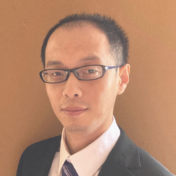Catching Up with Pilot Grant Recipients Ali Jalali, Austin Kilaru, and Hao Zhang

Every spring, the Center for Health Economics of Treatment Interventions for Substance Use Disorder, HCV, and HIV (CHERISH) awards competitive pilot grants to investigators interested in developing health economic research in our areas of interest, with a focus on junior investigators and trainees. Funded by the National Institute on Drug Abuse, CHERISH pilot grants provide these investigators an opportunity to initiate new research and address the feasibility of their proposed study before applying for additional funding.
While 2020 ushered in challenging moments, the sixth cohort of pilot grant recipients, Ali Jalali, Austin Kilaru, and Hao Zhang, concluded their funding year with new analytical skills and unique accomplishments. “We have been fortunate with all of our pilot grant recipients. They do great and interesting work, and this class was no different,” says Pilot Grant & Training Core Director Brandon Aden.
As CHERISH welcomes a new group of pilot grant recipients, we are delighted to continue supporting the sixth cohort on their journeys as early career researchers. Here is their take on the pilot grant experience and what they are working towards next:
Ali Jalali, PhD, MA

Ali Jalali joined the Division of Comparative Effectiveness & Outcomes Research at Weill Cornell Medicine as a postdoctoral associate in 2019 and was promoted to assistant professor in April 2021.
Ali Jalali’s research will be the first study to provide Medicaid healthcare resource unit cost estimates for pregnant women with opioid use disorder and their infants.
How has this pilot grant shaped or supported your career?
The CHERISH pilot grant provided financial support for me to pursue timely research and develop expertise in the field of addiction and substance use disorder treatment and policy. CHERISH organized multiple avenues and virtual events in the past year for early career investigators like myself to network and build a mentorship group with CHERISH Research Affiliates and investigators. Effective mentorship and access to a network of interdisciplinary scholars is invaluable at this stage in my academic career.
What’s next after the pilot grant?
I am excited to complete my pilot grant research aims and disseminate the findings through scientific publications and with support from the CHERISH Dissemination and Policy Core. I hope that early results of my research—made possible through the CHERISH pilot grant—will continue to advance my academic career at Weill Cornell Medicine.
Austin Kilaru, MD, MSHP

Austin Kilaru completed the National Clinical Scholars Program and is a new senior fellow at The Leonard Davis Institute of Health Economics at the University of Pennsylvania and Assistant Professor of Emergency Medicine at the University of Pennsylvania Perelman School of Medicine.
Austin Kilaru’s pilot study examines adherence to medications for opioid use disorder, such as buprenorphine and methadone, following an opioid related emergency department visit.
How has this pilot grant shaped or supported your career?
The experience has opened the often siloed work that can happen in my specialty, and it brought together investigators with similar interests from different institutions together. The research becomes more feasible and fun, like we’re all pulling together intellectual and analytical firepower. I was able to learn from collaborators like Yuhua Bao and fellow pilot grant recipient Hao Zhang. It shows when you work with other people – it strengthens your research.
What’s next after the pilot grant?
In addition to completing my pilot project, I am applying for a NIDA career development award as a new faculty member at Penn—the CHERISH pilot work has deeply shaped my future research plans. I’ll also be mentoring a recipient of the next CHERISH pilot cycle, Dr. Ravi Gupta.
Hao Zhang, PhD

Hao Zhang completed his post-doc and is now a research associate in the Division of Comparative Effectiveness & Outcomes Research at Weill Cornell Medicine.
Hao Zhang’s pilot study evaluated prescription drug monitoring programs and identified potential unintended consequences for patients with sickle cell disease and boney cancer pain. He presented his study at the 2021 Annual Research Meeting by Academy Health and published his research in JAMA.
How has this pilot grant shaped or supported your career?
The whole process—from grant application to data management and analyses and collaboration with co-authors from external institutions—was new to me. This project was the first time that I served as a principal investigator. Through the process I became familiar with the grant application procedure, enriched my research and publication experiences, and gained insight on the impact of prescription drug monitoring programs among different populations.
What’s next after the pilot grant?
This pilot grant is primarily exploratory, and the findings lay the groundwork for formal evaluation of opioid policies among the population of cancer patients. My supervisor Dr. Yuhua Bao has an R01 grant application currently under review that further explores these questions. We will use claims data from Health Care Cost Institute and SEER-Medicare to investigate the impact of opioid policies on opioid use and opioid-related adverse events among clinically important subpopulations of breast, prostate, colorectal, and lung cancer patients.